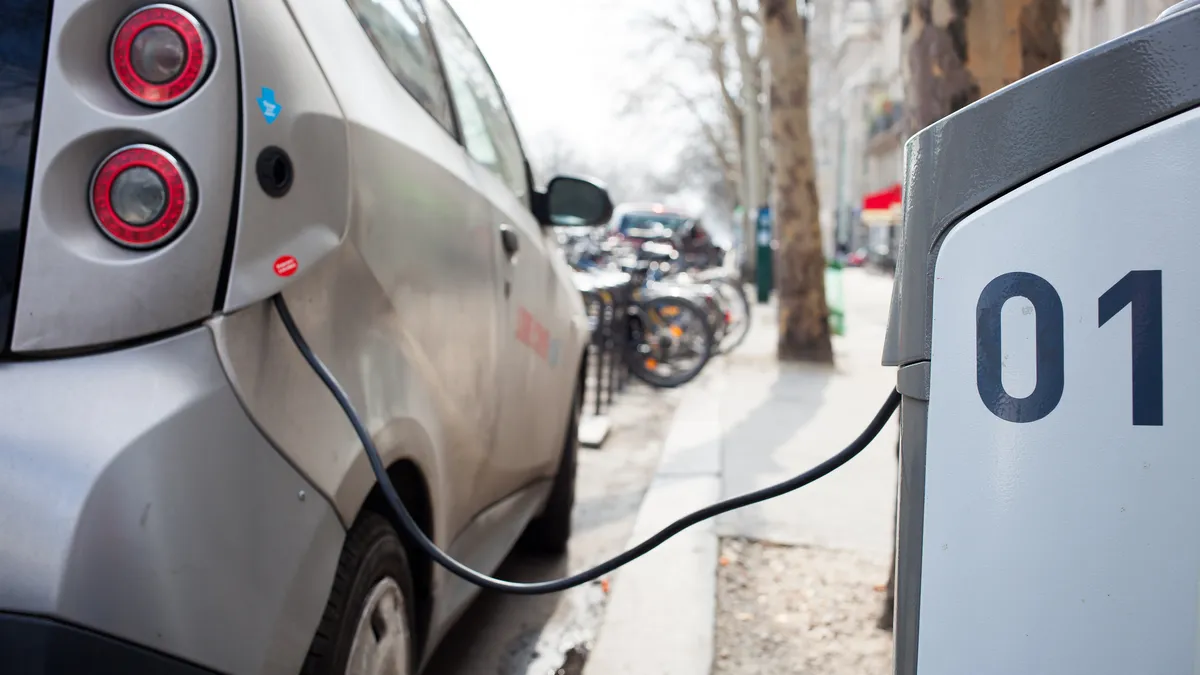Dive Brief:
- Pepco, the sole electric distribution company in the District of Columbia, last week unveiled a $15 million transportation program aimed at reducing the carbon footprint of the city's drivers and making charging infrastructure available to all residents.
- D.C. Mayor Muriel Bowser has made the growth of electrified transportation options a priority for the city, noting that the transportation sector contributes more than 20% of the District's carbon emissions. Plug-in vehicles (PIV) represent approximately 0.23% of the market, according to Pepco, compared with the national average of 1.2%.
- Of the 310,000 vehicles registered in D.C., only about 720 are PIV. Reaching the 40,000 PIVs predicted to be on D.C. roads by 2030 will require more than 1,000 Level 2 charging plugs and 76 DC Fast Chargers, the utility said.
Dive Insight:
The adoption of electric vehicles has been slower in Washington, D.C. than in other urban areas for a variety of factors, Pepco noted in its filing, including a heavy concentration of renters, and the grouping of public charging stations in just a few areas.
The utility's proposal highlights the unique challenges cities face in electrifying transportation, where infrastructure must be rolled out equitably to wide groups and lower levels of home ownership make it more difficult to switch to EVs, which most drivers charge largely at their residences.
The utility's role in owning charging infrastructure would be key in developing infrastructure across all areas of the city, said Bryan Clark, Pepco's director of utility of the future, said in filed testimony.
"The competitive market, left to itself, will develop infrastructure where it is easy and profitable, but not necessarily where it is needed, and not in an equitable way," Clark told regulators. "In particular, it is clear that some markets in the District are underserved — like charging stations for [multi-dwelling unit] residents, taxis and fleets."
There are 98 public charging stations aggregated in the downtown and midtown areas of D.C., and they "do not provide easy access to residents who do not live or travel in these areas," Pepco told regulators.
The utility says availability of charging stations is an issue that must be addressed for EVs to flourish in a city with almost 700,000 residents, 400,000 daily commuters and about 21 million visitors each year. The District has some incentives for EV ownership, including a discounted rate for first-time vehicle registration and access to high occupancy vehicle lanes, but these do not address the need for charging infrastructure.
According to Pepco, in "most urban areas" the PIV market has grown over the last seven years, while District residents "have not been keen on or consistent in their adoption." Some of this, the utility says, is because about 66% of homes in the District are occupied by renters, "who may be even less inclined to purchase PIVs because they do not control the ability to install a PIV charging unit."
Pepco's transportation electrification program (TEP) is a part of the city's wider grid modernization efforts and contains 13 separate offerings, including a whole house time-of-use (TOU) rate plan and a range of rebates for homeowners and businesses to install smart charging equipment. For qualified customers who own or operate office buildings or garages where dedicated parking can be made available, Pepco is proposing to offer 50% off of the cost of a Level 2 charger.
Pepco also proposed installing 20 DC Fast Chargers in the city, and said it will target locations that serve "local and long distance travelers across the District, such as shopping centers, convenience stores, restaurants, and other such destination locations where people stay for 15 – 30 minutes."















